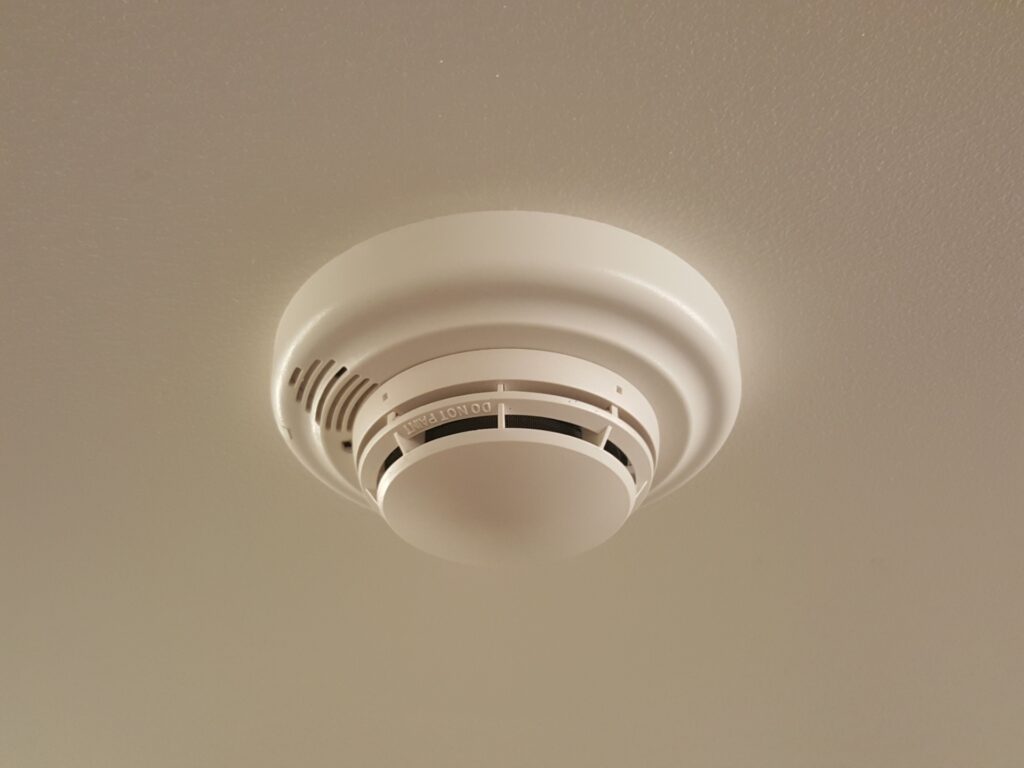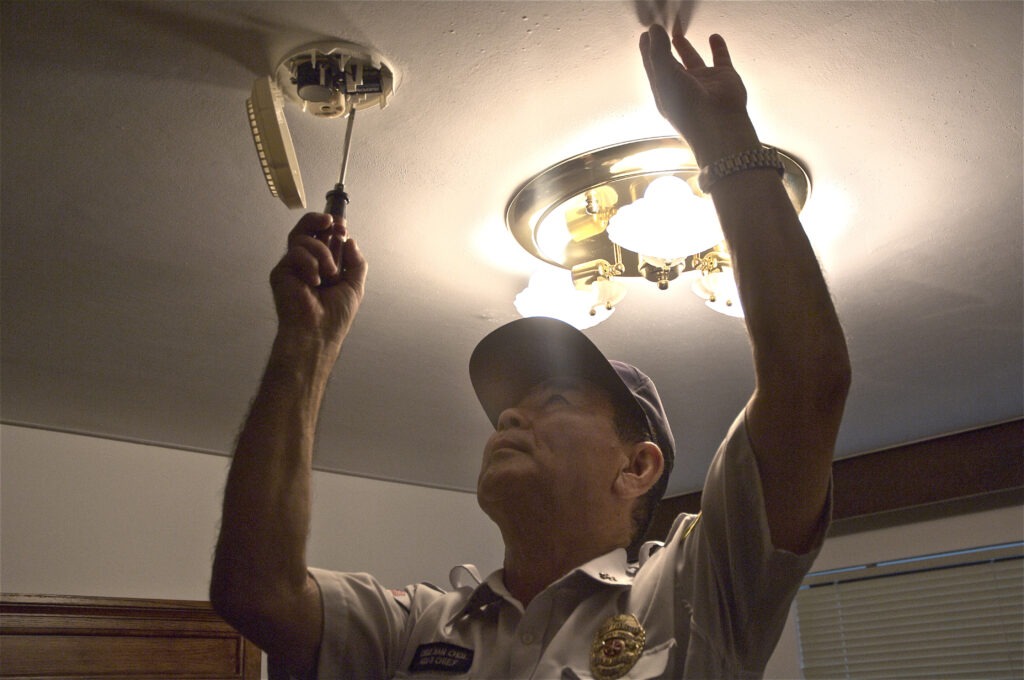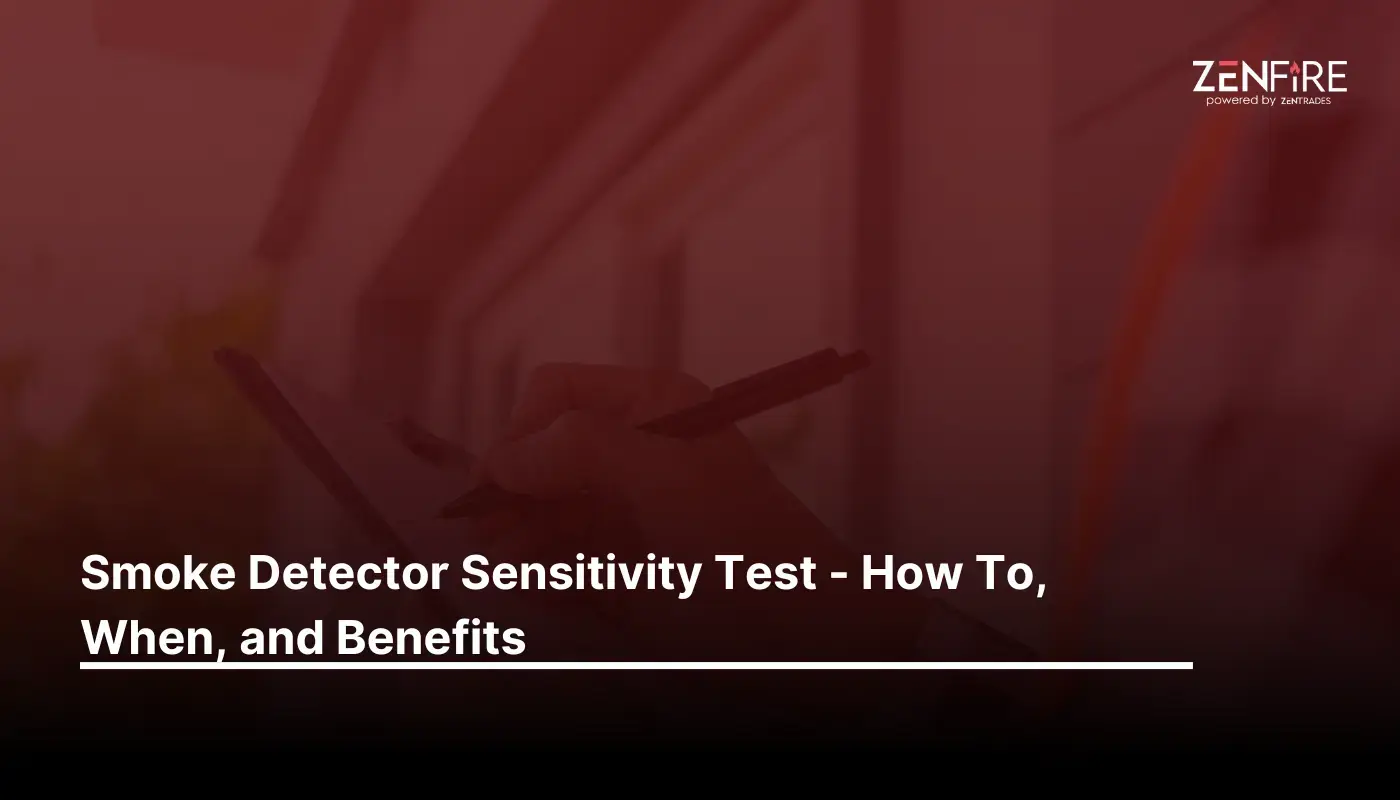Conducting a Smoke Detector Sensitivity Test - How To, When, and Benefits
- Field Service Management
- 9 Min Read
We sleep soundly at night, knowing that we’re safe from incendiary outbreaks thanks to some installed smoke detectors and other fire prevention systems. But what happens when they fail you? The importance of these systems is an integral part of someone’s everyday life and a regular smoke detector sensitivity test keeps these systems in check.
Suppression systems are an essential component of any building’s safety infrastructure. Installed security and alarm systems must be tested to detect smoke particles. Ensuring these detectors operate within their designated sensitivity range is paramount.
ZenFire aims to spread fire safety awareness among the masses through informative resources for contractors and inspectors like yourself. Head to our website for more informative articles that enhance your business knowledge. Our field service management software can also streamline and optimize your workflow to generate growth and more revenue for your business!
This article will explore the significance of smoke detector sensitivity testing, its benefits to the fire alarm, and why it should be a routine part of every protection system maintenance plan.
Here What We Cover
How to Conduct a Smoke Detector Sensitivity Test
Every smoke detector should be marked with its appropriate range. This information is crucial for testing and maintenance purposes.
While testing the equipment you yourself can provide insight into your safety system’s sensitivity, professional tests can offer more assurance that each device is functioning correctly, as they check every part of the smoke detector, like its detector chamber.
Install an addressable fire alarm system in which the control unit automatically gives a trouble signal when the detector is very sensitive or near the extent of its sensitivity range.
Detector sensitivity testing requirements align with NFPA guidelines, which mandate regular scheduling and maintenance of a sensitivity test for these vital components in your suppression system
The efficiency of smoke detector sensitivity is also influenced by many other factors, such as:


Use our free estimate template now
Make winning quotes in minutes—for any industry and any job.
Refined Detection Technology
Advancements in smoke-detecting technology have facilitated the creation of more precise and dependable detectors. Smoke detectors that work well in various circumstances include photoelectric and ionization models. They also prevent unwanted alarms.
Centralized Observation
Integrated central monitoring services are a common feature of contemporary suppression systems. In addition to improving overall safety, this enables real-time alarm monitoring, prompt response coordination, and remote system administration.
Advance Systems
Mechanisms for both fire detection and suppression are combined in pre-action fire suppression. They reduce water damage in sensitive areas and safeguard expensive goods, as the water damage restoration process is lengthy and costly sometimes. To avoid such incidents, these advanced smoke detectors are designed smartly..
Sprinklers for Fires
Sprinkler systems are essential for suppressing fires, even while smoke detectors offer early warning. They work in tandem with smoke detectors to mitigate damage effectively.
Emergency Response Plans
A comprehensive safety plan encompasses more than just equipment. It includes evacuation procedures, employee training, and clear communication protocols to ensure everyone’s safety during an emergency.
Advantages Of Flat Rate Pricing
A flat rate simplifies the pricing process and makes it easier for customers to understand the cost of a product or service. Additionally, flat rate pricing can encourage customers to purchase more of a product or service since they know the price will not increase with quantity. There is no need to do any math to determine the cost – the price is the same.
When you use flat rate pricing, you can also be sure that no matter what kind of customer they are or how many services they need, they’ll always get an accurate estimate and satisfaction guarantee. You’ll find that people are more willing to pay for quality work when they know what they’re getting, as since flat rate pricing is so straightforward,
In case of time and material pricing for jobs may take longer than expected, customers sometimes feel cheated as they believe the job took longer than it should have. As they would have to unexpectedly pay more for longer hours.
There is also an increase in efficiency in the flat rate price book as workers are incentivized to work faster and increase profits as businesses can predict their earnings more accurately. With a flat rate pricing plan, you can determine precisely how much money will be coming in and how much will be going out without any confusion or misunderstanding. It’s easy to keep track of your costs and stay within budget. This can be helpful for businesses that want to avoid confusion or sticker shock.
But, before you plan to boost your income with flat rate pricing, it’s essential to see the challenges you might face with the pricing structure.
How Do You Adjust the Sensitivity of Smoke Detectors?
Defective smoke detectors can increase the possibility of a false alarm, disrupting your day incessantly. Dust, steam, or debris that accumulate inside the detector chamber often cause the smoke detector’s sensitivity to malfunction.
You can adjust the sensitivity of the smoke detector to alert for actual smoke by:
Cleaning the sensor inside the detector and
Adjusting the data card tab on the circuit board with a screwdriver.

Inside Smoke Detector
Get posts like this in your inbox.
Keep learning how to run a 5-star business with our bi-weekly newsletter.
Smoke Detector Sensitivity Testing Requirements
A smoke detector should be marked with the correct sensitivity range.
Using UL-approved equipment to confirm proper device functioning in the listed sensitivity range
Professionals should test equipment routinely.
When Do Tests Need to be Conducted?
The NFPA 72 provides guidelines for when these smoke detector tests should occur:
Monthly:
Inspect your smoke alarm with the test button. It should sound.
If your fire alarm lacks a test button, it’s outdated and should be replaced.
Follow the manufacturer’s instructions for the test and maintenance of the alarm.
Check the detector expiration date on hard-wired smoke alarms.
Yearly:
Switch the batteries in all smoke alarms every year during the test per the manufacturer’s recommendations.
Every two years:
Remove the cover and clean it with a damp cloth.
Carefully vacuum the inside of the alarm.
Reassemble the smoke detector fire alarm and ensure it’s functioning correctly.
Once in ten years:
Swap out the smoke detector.
Remember that all fire alarms, even hardwired and battery-operated models, have an expiration date.
The test frequency (first test, second test, etc.) will depend on the date and results of the last test and the accumulation of dust or steam.

Benefits of Smoke Detector Sensitivity Testing
Sensitivity testing of the installed smoke detectors is essential to fire safety. It guarantees that the smoke detectors installed will function optimally, providing early warnings to building occupants and saving costs.
Detects Outbreaks Early
Regular tests can ensure that the detectors effectively detect any presence of smoke at an initial stage.
Protecting Building Occupants
In an emergency, a reliable detection system is your first line of defense. Sensitivity testing ensures that your smoke detectors respond promptly to smoke, thus safeguarding the lives of employees or building occupants.
Complying with NFPA Codes
Adherence to NFPA codes is imperative for any business. Regular sensitivity testing of smoke detectors is essential to adhering to the National Fire Protection Association (NFPA) requirements. Failing to do so may result in legal consequences, fines, and increased risks in the event of a fire.
Reducing Smoke Detector False Alarm
Overly sensitive smoke detectors can cause false alarms, disrupting normal operations and potentially desensitizing staff to the importance of alarms. However, it’s crucial to understand that no alarm is false; something is triggering it. Regular sensitivity testing helps fine-tune your alarm system, minimizing unwanted alarms.
Extension of Equipment Lifespan
Periodic testing and maintenance are of utmost importance to extend the lifespan of smoke detectors. Thus also preventing the need to replace them sooner, saving costs and resources.
Saving Money on Fire Protection
Cost-effectiveness is a significant concern for businesses. Regularly testing and recalibrating them extends their lifespan, reducing the need for equipment replacement and preventing workplace dangers associated with poor fire detection.
Conclusion
Routine sensitivity testing is fundamental to maintaining an adequate safety infrastructure. It optimizes your detectors, reduces false fire alarms, and saves costs. Fire safety and security is not just about compliance; it’s about protecting what matters most—the people and assets within your facility.
ZenFire field service management software can streamline and optimize your workflow to generate growth and more revenue for your business!
Book a FREE demo today to start streamlining your workflow!

Explore a better way to grow your business. Book a free demo now!
Get organized, win jobs, and wow customers.
Book A Free Demo with ZenTrades Today!
Related Reading
Why Your Field Software Management Software Needs QuickBooks Integration
ZenTrades Why Your Field Service Management Software Needs QuickBooks Integration Read More Request Demo...
Read MoreZenTrades How To Manage Electrical Service Agreements Like...
Read MoreZenTrades The Best 5 Jobber Alternatives In 2023...
Read More

